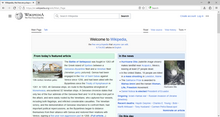Waterfox
 | |
 Screenshot of Waterfox G6.0.5 running on Windows 10, showing the English Wikipedia. | |
| Original author(s) | Alexandros Kontos |
|---|---|
| Developer(s) | Alexandros Kontos, BrowserWorks Ltd |
| Initial release | 27 March 2011 |
| Stable release | 6.5.0[1]
/ 31 October 2024 |
| Preview release | G6.0 Beta 5
/ September 14, 2023 |
| Repository | |
| Written in | C, C++, CSS, JavaScript, XUL |
| Engine | Gecko, SpiderMonkey |
| Operating system | |
| Platform | x64, ARM64, PPC64LE |
| Type | Web browser, mobile web browser, feed reader |
| License | MPL-2.0 |
| Website | www |
Waterfox is a free and open-source web browser and fork of Firefox. It claims to be ethical and user-centric, emphasizing performance and privacy.[2] There are official Waterfox releases for Windows, macOS, Linux and Android.[3][4] It was initially created to provide official 64-bit support, back when Firefox was only available for 32-bit systems.[5]
Divisions
[edit]Waterfox
[edit]Waterfox shares core features and technologies like the Gecko browser engine[6] and support for Firefox Add-ons[7] with Firefox. It is also compatible with Google Chrome and Opera extensions.[2] It disables telemetry and Pocket by default, which are present in Firefox builds. However, it collects technical information about the user's device to update properly.[5]
Waterfox Classic
[edit]Waterfox Classic is a version of the browser based on an older version of the Gecko engine that supports legacy XUL and XPCOM add-on capabilities that Firefox removed in version 57.[8][9] It is still partially maintained with fixes and patches from Waterfox and Firefox ESR releases. However, its development has been separated due to several changes from Waterfox that are otherwise unapplicable.[10]
Vulnerabilities
[edit]Waterfox Classic has multiple unpatched security advisories. The developer states that "changes between versions so numerous between ESRs making merging difficult if not impossible".[11][10]
Privacy
[edit]Exodus Privacy Analysis demonstrates that it uses the following trackers:
- Google Firebase Analytics
- Mozilla Telemetry
- Sentry Crash Reports[12]
According to Exodus,[13] these are the same as the trackers used by Firefox, with the notable exclusion of the Adjust marketing platform that only Firefox uses.
History
[edit]Waterfox was first released by Alex Kontos[14][5] on 27 March 2011 for 64-bit Windows. The macOS build was introduced on 14 May 2015 with the release of version 38.0,[15] the Linux build was introduced on 20 December 2016 with the release of version 50.0,[16] and an Android build was first introduced on 10 October 2017 in version 55.2.2.[17]
From 22 July 2015 to 12 November 2015, Waterfox had its own search-engine called "Storm" that would raise funds for charity and Waterfox. Storm was developed with over £2 million of investor funding and powered by Yahoo! Search.[18][19][20]
In December 2019, System1, an advertising company which portrays itself as privacy-focused,[21] acquired Waterfox.[22][23] In July 2023, Alex Kontos announced that Waterfox had been turned into an independent project again.[24]
An Android release of the browser was made available via the Google Play Store in November 2023.[25]
Logos
[edit]-
Waterfox logo used until 2015
-
Waterfox logo used from 2015 to March 2019
-
Waterfox logo used from March to June 2019
-
Waterfox logo used from May 2019 to August 2023
-
Waterfox logo used from August to September 2023
-
Waterfox logo used from September 2023 to present
See also
[edit]References
[edit]- ^ "Release 6.5.0".
- ^ a b "What Is Waterfox and Is It Safe?". MUO. 13 September 2022. Retrieved 24 August 2023.
- ^ "Waterfox, Free Web Browser". www.waterfox.net. Retrieved 3 November 2022.
- ^ "Waterfox: Privacy Web Browser - Apps on Google Play". play.google.com. Retrieved 13 March 2024.
- ^ a b c Proven, Liam. "Waterfox: A Firefox fork that could teach Mozilla a lesson". www.theregister.com. Retrieved 24 August 2023.
- ^ "FAQ". www.waterfox.net. Retrieved 3 November 2022.
- ^ "Find and install add-ons to add features to Waterfox". www.waterfox.net. Archived from the original on 3 November 2022. Retrieved 3 November 2022.
- ^ Kev Needham (21 August 2015). "The Future of Developing Firefox Add-ons". blog.mozilla.org. Retrieved 7 September 2015.
- ^ Villalobos, Jorge (16 February 2017). "The Road to Firefox 57 – Compatibility Milestones". blog.mozilla.org. Retrieved 17 February 2017.
- ^ a b "Waterfox Classic development will continue, but as a separate project from G4". ghacks.net. 4 November 2021. Retrieved 24 August 2023.
- ^ "Unpatched Security Advisories · BrowserWorks/Waterfox-Classic Wiki". GitHub.
- ^ "Exodus Privacy Report for Waterfox". Exodus Privacy.
- ^ "Exodus Privacy Report for Waterfox". Exodus Privacy.
- ^ "About Waterfox". www.waterfox.net. Retrieved 3 November 2022.
- ^ Kontos, Alex. "Waterfox 38.0 Release". www.waterfoxproject.org. Archived from the original on 15 December 2017. Retrieved 15 December 2017.
- ^ Kontos, Alex. "Waterfox 50.1.0 Release (Windows, Mac & Linux)". www.waterfoxproject.org. Archived from the original on 5 October 2017. Retrieved 5 February 2017.
- ^ Kontos, Alex. "Waterfox 55 Release (Windows, Mac, Linux and Android)". www.waterfoxproject.org. Archived from the original on 21 December 2017. Retrieved 15 December 2017.
- ^ Kontos, Alex (12 May 2015). "4 Year Anniversary: Waterfox Charity and Storm Search". www.waterfoxproject.org. Retrieved 15 December 2017.
- ^ "New search engine from Waterfox founder aims to take a punch at Google". www.telegraph.co.uk. 11 May 2015. Retrieved 3 November 2022.
- ^ Lake, Howard (7 August 2015). "'Ethical search engine' Storm to generate funds for charities". UK Fundraising. Retrieved 3 November 2022.
- ^ Brinkmann, Martin (14 February 2020). "Waterfox web browser sold to System1". ghacks.net. Retrieved 12 April 2020.
- ^ "Waterfox has joined System1". www.waterfox.net. 14 February 2020. Retrieved 17 February 2020.
- ^ "Welcome Waterfox!". www.system1.com. Archived from the original on 17 February 2020. Retrieved 17 February 2020.
- ^ Kontos, Alex (3 July 2023). "A New Chapter for Waterfox". www.waterfox.net. Retrieved 5 July 2023.
- ^ Eswarlu, Venkat (30 November 2023). "Firefox fork Waterfox is now available for Android with strict privacy defaults". MSPowerUser.






